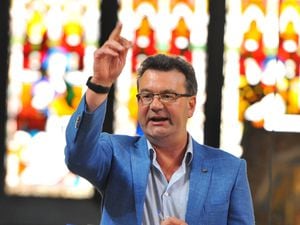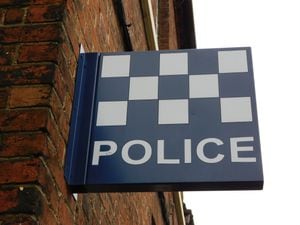Rugeley cancer survivor’s plea for charity as pandemic hits funding
"The surgery has left me with a scar but I wear that now like a badge of honour.”
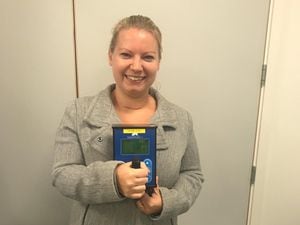
These are the passionate words of cancer survivor Grace Harris who found a golf ball-sized lump in her neck two years ago.
She was diagnosed with thyroid cancer after filming herself swallowing a glass of water in slow motion.
The 33-year-old, from Rugeley, underwent a procedure to have her entire thyroid gland removed before being isolated in a lead-lined room to undergo radioactive iodine treatment.
Mother-of-two Grace is sharing her story as part of Cancer Research UK’s public appeal to help tackle a devastating loss of funding caused by the Covid-19 outbreak.
Grace, who lives with her husband Paul and their children Georgina, aged 10, and eight-year-old Jacob, says she owes her life to cancer research.
“I kept getting a stabbing pain in my neck and it would hurt to talk,” said Grace, who runs her own craft business called Fizz Jewellery.
“I found some online advice about swallowing some water to see if there was a lump. Paul filmed it so that I could watch it back in slow motion. That’s when I saw there was a golf ball-sized lump right where it was hurting.”
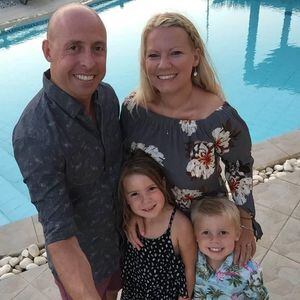
Although Grace had a blood test, nothing out of the ordinary showed up so she asked the GP for a cancer referral. “He told me I was very young but he got me a scan at Stafford two weeks later,” said Grace.
By the time the results came back four weeks later Grace was in a lot of pain.
“I just wanted it out,” she said. “I felt like it was getting bigger so I was gearing myself up for bad news. I remember we were swapping bedrooms around at the time and I said to my husband, ‘don’t order a dressing table yet, I might not be here to use it.’ I wasn’t being sad I was being practical. I’d even dug out my life insurance documents.”
After surgery to remove half of her thyroid where the lump was, Grace decided to have the other half removed as a precaution when tests showed the cancer might spread to other parts of the body. “Thyroid cancer is pretty rare but I was diagnosed with an even rarer type called follicular thyroid cancer,” said Grace, now 33.
“This can sometimes spread to other parts of the body, such as the lungs or bone so I didn’t want to take any chances.”
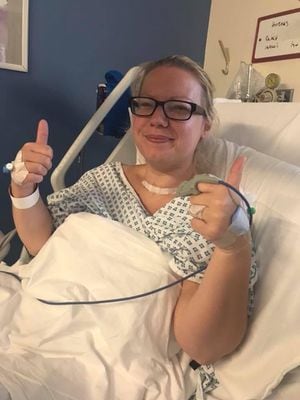
Grace was also given the chance to sign up for a Cancer Research UK funded clinical trial to see if radioactive iodine treatment is necessary for patients at low risk of their cancer spreading. The treatment is often recommended after removal of the thyroid to reduce the risk of the caner coming back.
Opting for the trial might have meant Grace missing out on the extra radioactive iodine treatment but she was prepared to take the risk.
“Cancer has been a big part of my family so for me it was a no brainer,” said Grace.
“Even if I’d been chosen not to receive the extra treatment, going on the trial gives you an extra level of scrutiny. Everything is double checked and the trials nurse was like an extra voice for me. There’s also the fact that, if it wasn’t for medical research, I wouldn’t have survived so I wanted to do my bit to help others in future.”
As it turned out Grace was selected for the additional treatment but it wasn’t easy. “The hardest part of it was not being able to hug the children for five days,” said Grace. “I had to go into a lead lined room and although I was allowed out after 24 hours, my radiation levels were too high to get close to the children.
“Fortunately, my levels went back to normal after five days so I was very lucky. The surgery has left me with a scar but I wear that now like a badge of honour.”
She is making a plea for public support comes as Cancer Research UK launches an urgent new appeal for donations to help get life-saving work back on track. Following the cancellation of fundraising events like Race for Life, the charity is expecting a £160 million drop in income in the year ahead.
As a result, Cancer Research UK has had to make the difficult decision to cut £44 million in research funding, but the charity says this is likely to be just the beginning.
Grace says: “It’s thanks to improved treatments that I’ve been given more precious time with my loved ones,” she added. “It upsets me to think about research being delayed and what this might mean for people affected by cancer in the future.
“By boosting funding now, we can all help to lessen the future impact on patients. So, I hope that people will be moved by the charity’s determination to carry on beating cancer and give what they can.”
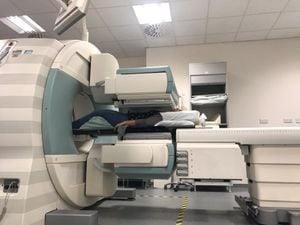
Cancer Research UK’s work into the prevention, diagnosis and treatment of cancer has been at the heart of progress that has seen survival in the UK double in the last 40 years.
Thanks to the generosity of its supporters, the charity currently funds around 50 per cent of all cancer research in the UK.
However, as a direct result of the coronavirus pandemic, promising projects which could have the big answers to cancer are being held up.
Paula Young Cancer Research UK spokeswoman for the West Midlands, said: “We’re grateful to Grace for helping to underline the stark reality of the current situation.
“Covid-19 has put so much of our research on pause, leaving us facing a crisis where every day and every pound counts.
“With around 31,600 people diagnosed with cancer each year in the West Midlands, we will never stop striving to create better treatments. But we can’t do it alone.
“Whether people donate, sign up to Race for Life at Home or shop at our stores, we believe that together we will still beat cancer.”
Cancer Research UK was able to spend over £11 million in the West Midlands last year on some of the UK’s leading scientific and clinical research.
To find out more go to cruk.org/donate


